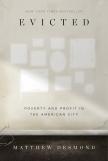Landlords From Dickens
Ever since President Bill Clinton implemented his plan to “end welfare as we know it” in the 1990s, low-income households have found it increasingly difficult to pay their rent. Welfare payments have barely budged in the last 25 years, while housing costs have soared. As successive administrations have adopted “tough on crime” laws and skimped on cash payments to the poor, incarceration has come to define the lives of black men, and eviction has shaped the lives of black women. Matthew Desmond, a Harvard sociologist, explains: “Poor black men were locked up. Poor black women were locked out.”
Prominent liberal and conservative politicians have recently agreed that mass incarceration is bad public policy but have largely ignored the eviction crisis. Experts believe that families should pay no more than 30 percent of their income on housing, but every year millions of households are evicted because they spend half their money on housing, and a quarter spend 70 percent. Evicted shows the enormity of the social costs of forced moves. Families go without food and shelter, suffer illness, depression and cold and become victims of crime in dangerous neighborhoods. Desmond finds no excuse for this state of affairs. “No moral code or ethical principle...can be summoned to defend what we have allowed our country to become.”
To understand the dynamics of the private housing market—a subject ignored by academic research—Desmond lived in a white trailer park in Milwaukee and in a rooming house in a black neighborhood, interviewed hundreds of landlords and tenants, and surveyed eviction practices. Evicted explores the lives of eight families—black and white, with and without children—who represent different aspects of the eviction problem. Their stories are riveting and bring to mind characters from Dickens and Steinbeck. Sherenna, a black landlord who sometimes buys her tenants groceries, finds “the ‘hood is good” for making money. She sympathizes with Lamar, a double-amputee tenant responsible for two boys, but “love don’t pay the bills.” She evicts him when his rent money comes up short. Arleen, a single mother, finally finds a place after 89 rejections, only to be evicted when her young son kicks his teacher and is followed home by the police. Scott, a recovering heroin addict who hopes to regain his nursing license, can’t afford both methadone and rent, so he checks into a homeless shelter. For Desmond, recording their stories “was heartbreaking and left me depressed,” but his profound understanding of their situations suggests the crisis can be solved.
Just as the market has crushed the poor, it has made others rich. Homeownership in poor, black neighborhoods, with depressed property values, is a bad investment, but being a landlord is a lucrative one. Mortgage payments are low; Sherenna’s worst properties yielded the biggest returns. Cheap housing in high demand means a low vacancy rate, and landlords have little incentive to lower rents or make repairs. Although landlords are in theory required to maintain their rental property, that duty is excused when the tenant falls behind in the rent. Once the tenant withholds rent to force repairs or in order to save to find a new place, the landlord can initiate eviction proceedings. Landlords usually find it cheaper to evict tenants than to make repairs. When the court authorizes an eviction, companies providing eviction and moving crew, and storage and debt collection services profit at the tenant’s expense.
Evicted tenants have a tough time finding a new home because landlords may refuse to rent to them and to those with criminal records. Although property management companies hold all applicants to the same criteria, denying housing to applicants with a criminal or eviction history has a disproportionate impact on African-Americans. Families with children also face barriers to decent housing. In 1976 Congress prohibited landlords from discriminating against families with children, but Desmond found that discrimination remains widespread. When combined with the trauma of a sudden and forced move, these screening practices inevitably push evicted renters into the most depressed and dangerous areas of the city.
Landlords also use nuisance ordinances to get rid of tenants they consider a problem. These ordinances allow police departments to penalize landlords for the behavior of their tenants. A property that generates an excessive number of 911 calls is designated a “nuisance.” Desmond’s survey found that landlords who received a nuisance citation for domestic violence frequently evicted the tenant. Thus, battered women can either keep quiet and face abuse or call the police and face eviction.
Desmond believes that a universal housing voucher program would minimize evictions and eliminate most homelessness. A family would spend no more than 30 percent of its income on housing cost, and the voucher would pay the balance. A voucher would give Arleen more money to keep her children clothed, fed and off the streets. Desmond’s proposal would require landlords to accept vouchers and make repairs. Congress currently spends $40.2 billion for direct housing assistance; a voucher program would raise the bill to around $60 billion, much less than the $171 billion in tax benefits homeowners receive. While Desmond’s proposal seems reasonable, it is questionable whether Congress is willing to confront the moral choice he presents.
Correction July 5, 2016: An earlier version of this review once incorrectly referred to the title of the book under review as Eviction rather than Evicted.
This article also appeared in print, under the headline “Landlords From Dickens,” in the July 4-11, 2016, issue.








